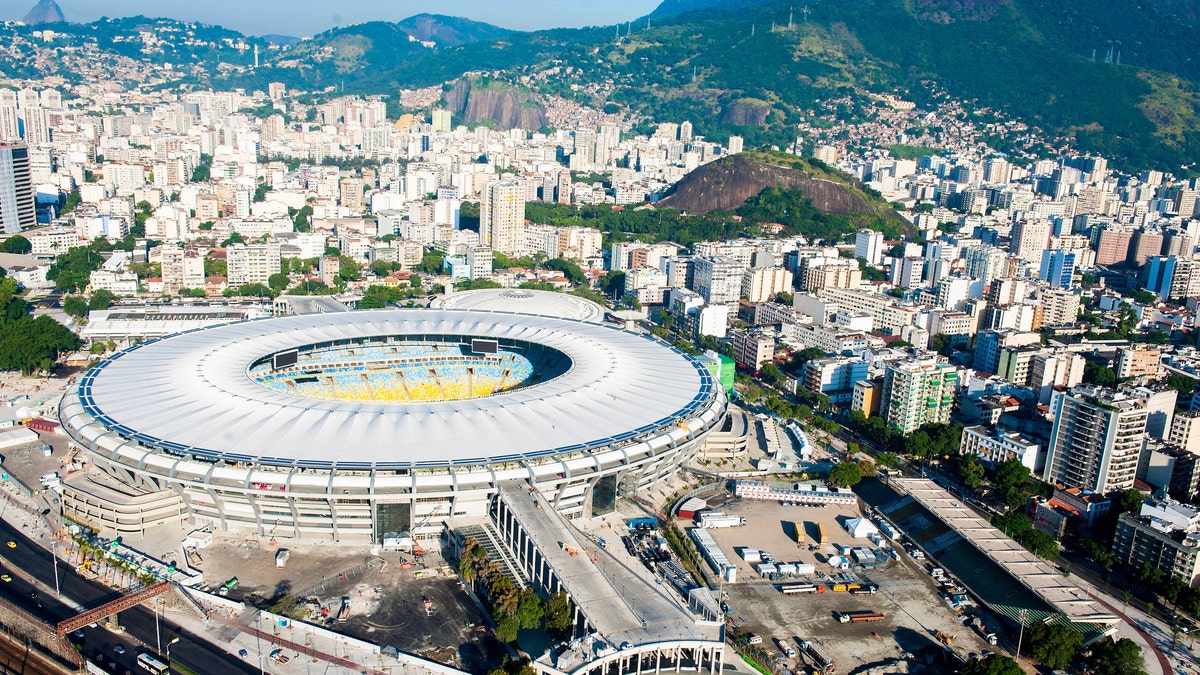
An aerial view of the Macarana stadium in Rio de Janeiro, Brazil. (Photo by Buda Mendes/Getty Images) (2013 Getty Images)
The Brazilian Olympic Committee got interrogated by the IOC regarding concerns about delayed preparations for South America's first games.
Carlos Nuzman, head of the Brazilian Olympic Committee and the 2016 Rio de Janeiro Games, offered few concrete responses to blunt questions Sunday as he sat in front of about 100 IOC members during their general assembly in Buenos Aires.
A team of IOC inspectors — headed by Morocco's Nawal El Moutawakel — visited Rio a week ago and warned that work must be sped up. El Moutawakel sat near Nuzman and repeated the need for transparency in preparations and better cooperation between various levels of government.
In prepared remarks before taking questions, Nuzman attempted to allay concerns among his IOC colleagues.
"We have made significant progress," he said. "I can assure you once again: Rio will be ready. There is a lot of work ahead. We fully understand our task."
- World Anti-Doping Agency Revokes Status Of Rio Lab Being Used By FIFA
- Ryan Lochte Says Michael Phelps Will Be In Brazil For The 2016 Olympics
- Barcelona Readies 2022 Bid After Madrid Loses 2020 Summer Olympics To Tokyo
- Latinos Representing USA in the 2012 Olympics
- Special Olympics: Blind Argentine Team Trying for Gold
- Olympics 2012: Dominican American Félix Sánchez Wins Gold
Not everyone was convinced.
Kevan Gosper of Australia, head of the IOC press commission, had questions about media preparations, and then offered frank advice.
"You simply have to keep your public informed what's happening," Gosper said. "The biggest commitment you have is to explain the principles of social investment impacting on your city as you're preparing for these games. If the community doesn't get it, you will have a repeat of what you had."
Gosper was referring to violent street protests that took place daily in June during the two-week Confederation Cup — a warm-up for next year's World Cup. Police used tear gas and rubber bullets to break up most demonstrations, including one outside the tournament final between Spain and Brazil at Rio's famed Maracana stadium.
"Please forgive me if I've been a bit forthright," Gosper added.
Nuzman had few answers for Gosper. He was also asked by Syrian IOC member Samih Moudallal about the protests.
"We have a free country," Nuzman said. "We have a democracy and everybody can express an opinion. ... "These (protests) are happening in several countries, several cities in the world."
Protests, which included about 1 million at their peak, centered on Brazil's poor public services, high taxes and anger about spending about $13 billion to organize the World Cup — and perhaps even more public money for the Olympics.
El Moutawakel referred indirectly to street protests in her prepared comments.
"Over recent months, the social and political environment in which Rio 2016 and their government partners are operating has significantly changed," she said. "There is now a need more than ever before that all stakeholders work in an open way and place legacy at the very heart of all decisions — including those of the Olympic Games."
IOC member Richard Peterkin of Saint Lucia had questions about preparations, drawing a laugh when he joked with Nuzman that some IOC members visiting the 2007 Pan American Games "got in taxis to see Christ the Redeemer (monument) and ended up in Buenos Aires."
"You really have a tall task on your hands, and it's not an easy one in a country as large as yours with as many people that have social needs," he said. "You probably have to accept that the situation is becoming critical in many areas and you need to reevaluate those weaker areas and make the changes that are necessary."
Based on reporting by The Associated Press.
Follow us on twitter.com/foxnewslatino
Like us at facebook.com/foxnewslatino
